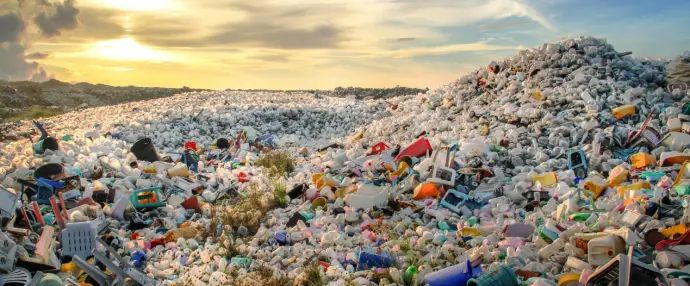New packaging solution is step closer to a plastic-free world

Collected Image
The Jerusalem Post has partnered with ExitValley, a digital platform that enables anyone to invest in Israel's start-up ecosystem and share in its success. In this article, we are pleased to introduce W-Cycle, an Israeli company that developed a game-changer home compostable, non-coated food packaging solution from a new material called SupraPulp.
The company is focusing on food packaging, hoping to replace plastic packaging. "Plastic is an amazing material," says Lior Itai, Co-Founder & CEO of W-Cycle. “It is very cheap to produce, and it has the appropriate properties to meet our needs in the world of packaging. But there is a big problem with plastic - not knowing what to do with it after production, and a waste problem arises.”
“Pulp (cellulose) from any feedstock can be used as a basis for our products,” he adds. ”Sugarcane bagasse, reed, wood, banana leaves – any fiber can form the shape of the product and provide its mechanical properties. Feedstock is a renewable resource. We're doubling the positive impact by using the waste of a renewable resource. "When we started the company, we asked ourselves how we would solve the waste problem at the source,” Itai explains. “We decided to look at what happens in nature. Food scraps that are thrown on the ground, like a fruit peel, simply decompose – it is a natural action. Nature takes care of dismantling this waste. We decided to stick to this model.”
He explains that in order to fulfill the company's vision of replacing plastic, they needed a solution that would stand on three main pillars: environmental raw material, the ability to upgrade it so that it would be sufficiently durable, and of course, economic efficiency. “All of our materials need to be degradable by nature,” he says, “and of course, it needs to have plastic-like properties, such as maintaining stability at high and impermeable levels. We were able to obtain these properties from the pulp using advanced technology. "There is also the issue of price," he adds. "There are quite a few solutions or alternatives to plastic today, but they are costly, and it is not cost-effective for the client to make that transition.
We understood that we had to crack the financial issue. We knew that the ideology would give us direction, but the economy would push us forward.”
Since the costs of producing the new product were still more expensive than using plastic, the company opted for a circular economy model to solve the problem. "Our raw product is pulp, and there are a lot of agricultural organizations that produce food and have leftover waste," Itai explains. He cites the sugar industry as one example. After sugar cane is grown and processed, hundreds of thousands of tons of crushed cane remain, from which the pulp can be extracted. “We have developed a model where we buy the raw materials cheaply, and along the way, those farmers can turn their organic waste into an additional source of income.
"In addition, we realized that a large part of the cost comes from transporting the products over great distances, which is an expensive and polluting process. Our model uses the fact that there are agricultural companies everywhere in the world, and we can use their agricultural waste. This way, we get the raw materials in the same area as our final product’s delivery destination.”
Mankind produces 360 million tons of plastic annually, about 40 percent of which is used for packaging. Unfortunately, only about 9 percent of the plastic in the world goes to recycling facilities, and of that, only 30 percent actually goes through a recycling process. "The packaging market is huge," Itai says. "We decided to focus on food packaging, and for that, we had to provide biodegradable packaging that would address products that have a long shelf life and that have all the necessary safety credentials."
Pulp, the raw material that W-Cycle uses, is present in almost every plant in the world, making it a cheap, accessible, and no less important, renewable raw material. However, the problem is that pulp has the properties of paper, and in food packaging, one must consider that foods are rich in moisture and liquids. "This is where the technological side comes into play," explains Itai. "How we take the cellulose from the plant and change its properties without compromising its most important feature, which is biodegradability."
W-Cycle is currently creating next-generation SupraPulp, which will be a compostable high-barrier solution for the food and beverage packaging market based on its existing patent. The company works with food manufacturers, institutions such as schools and hospitals, restaurants, and transportation providers worldwide. Amongst its customers are leading global food manufacturers, airlines and others. It is now entering a fundraising round to accelerate activity in the food packaging market, which generated over $315 billion last year. “We’re one step closer to a plastic-free world by offering a no-compromise food packaging solution that contributes to the protection of the environment and value chain of both nature and humans,” Itai summarized.
Source: https://www.jpost.com
Tags :
Previous Story
- PCX Markets launches global platform for purchasing certified...
- Can everdrop scale its plastic-bottle-free cleaning products, as...
- LG Chem Develops Advanced Plastic Product to Prevent...
- Egypt, Okeanos sign deal to manufacture plastics made...
- New Report Finds Slow Progress on Sustainable Plastic...
- Plastic industry aims to double exports to $25...
- New Maine law targets chemicals in food packaging
- Suntory develops plastic bottle made entirely of plant...